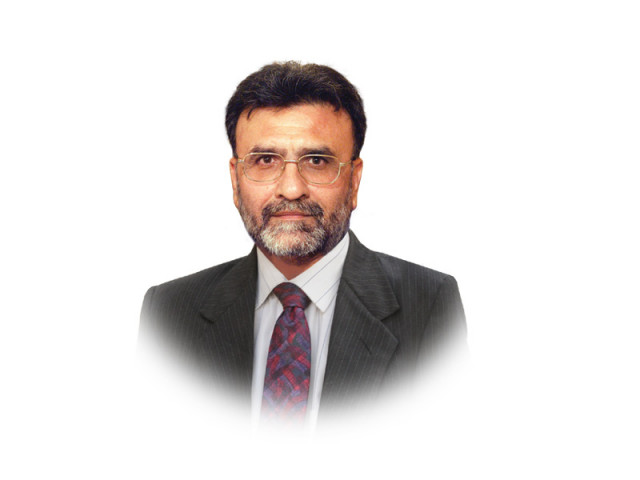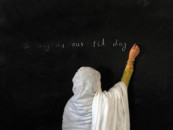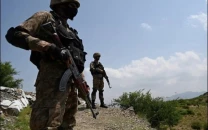Achakzai, Rashid tell frightening, depressing tales
Mehmood Khan Achakzai and Sheikh Rashid Ahmad represent almost two opposite extremes of our political spectrum.

The Pushtun nationalist from Balochistan even widely quoted from a fresh book of an American author that coincidentally had the title of “No Exit.” Achakzai referred to this book as clearly reflecting the collective thinking of various US-based think tanks, journalists and national security analysts known for specialized monitoring of the Af-Pak affairs.
Such writers, Achakzai went on, seem constantly building the narrative that the US-led forces of NATO failed to complete their mission in Afghanistan due to the alleged ‘double game’ that Pakistan had been playing with them. “The sole superpower of these days, in short,” he concluded worriedly, “perceived Pakistan as the real enemy.”
Pakistan, Achakzai kept on stressing, could survive and thrive, only by confronting the emerging challenges to its existence as a united nation, where smaller province genuinely consider them as equal partners of a democratic federation. And in this context this very sober and rational promoter and defender of democratic polity did not sound too hopeful.
Throughout his political career, Mehmood Khan has never appeared gullible to conspiracy theories. On Wednesday, however, he did shock many of his ardent admirers by claiming that a definite set of invisible forces, known for making and breaking governments in this country, “were actively considering the idea of installing a government of technocrats that should rule with full blessings of the deep state for at least three years.”
Cutting across the party divide, Achakzai pleaded in the end, each person sitting in this assembly should take rumors regarding the installation of a government of technocrats far more seriously. They must realize that this assembly could very well be the “last parliament” of Pakistan that many in the US have already begun calling “the failing state.”
He urged parliamentarians to get together and start doing everything possible to protect the existence and relevance of democratic forums and governance passionately. Yet, the same Achakzai did not sound too hopeful when it came to the question of “protecting free media.” He rather insisted with a firm tone that “no lawyer in Pakistan would ever be able to defend those six hours that a particular channel consumed to name and blame the head of an institution” after the attack on a famed anchor in Karachi on April 19. He also preferred not touching some ominous questions that the PTI had begun putting with shrieks and street rallies regarding “independence” of our judiciary.
Speaking before Mehmood Khan, Sheikh Rashid Ahmad had not focused on ‘big picture.’ He rather kept on wondering, quite anxiously, whether this national assembly could really be able to evade the types of attacks that were previously made on GHQ and various other buildings associated with national defence and security.
Without naming any specific group, Sheikh Rashid Ahmad, dared the deputy speaker to affirm or deny the story he eventually told to all of us Wednesday. Murtaza Javed Abbassi preferred keeping quiet and this forced me to take the story told by Sheikh Rashid Ahmed far more seriously.
“Not once but on three occasions, I voluntarily went to the Speaker’s office to inform him that (some people) have completed various rounds of intense exercises in Margalla Hills,” thundered Sheikh Rashid. The real aim of these exercises was to sneak into the prime minister’s house. “If failing in getting there, (the same people) have also prepared a plan-B, which aims at taking over the parliament building and take all of us (members of the national assembly) as hostages.”
Sheikh Rashid Ahmad was doubly jittery for according to him the police and the rest of personnel deputed to protect the parliament building “have no will and the capacity to protect us.” There is but “one institution,” stressed Sheikh Rashid, which can prevent such an attack on parliament, “but true to his nature Nawaz Sharif continues to annoy and alienate” the said institution.
I seriously imagined that the frightening story that Sheikh Rashid had told would trigger an intense debate in the house. No one cared to take him seriously, though. In the end the ruling and opposition benches were rather found too keen to find out whether the “iron used for building structures for Rawalpindi-Islamabad Rapid Bus Service” had been purchased from Pakistan Steel Mills or the famed factory of the steel and iron goods that is owned by the ruling family.
Published in The Express Tribune, May 15th, 2014.



















COMMENTS
Comments are moderated and generally will be posted if they are on-topic and not abusive.
For more information, please see our Comments FAQ